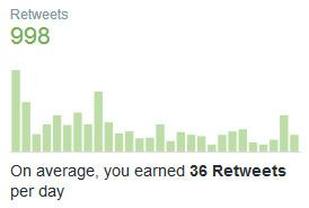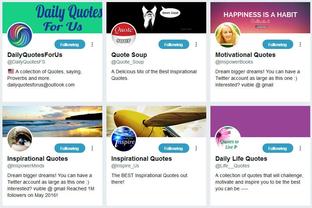
And remember that Twitter is a bit like a radio station. When you stop talking, you disappear! So, if you want to keep appearing in front of your followers you must keep tweeting!
Tweet well and often
Needless to say, it's important that those tweets are good quality. They can't just be junk. If you are offering quality and quantity this will ensure that those in your network are well aware of you and increase your authority at the same time.
So, when tweeting (as opposed to retweeting and replying) always remember to vary the content. Make some of them links to your blog posts and some links to blog posts by others. Also link to videos, infographics -- even press releases. Self-contained tips, insights and comments on your subject are also worth sharing.
And always use hashtags to make those individual tweets easier to find. Just doing that will draw followers as well as clicks to the website linked in your profile.
Retweet those tweets!
There's another benefit from tweeting a lot. It's kind of obvious but people don't take nearly enough advantage of it. It's this: The more you actually tweet, he more you have to retweet.
That's important because Twitter is so fast, with people sharing heaps of content every minute, so it's easy for your stuff to get buried underneath all the rest. So, you should reshare each one a few times (preferably at different times of the day) to ensure it's being seen by as many people as possible.
Engagement alone is not enough
Now if the vast majority of your activity is replies and retweets (engagement) that's valuable. You build rapport with others, and grow authority. But the downside is that you have next to nothing to retweet. That's because once you've retweeted something, Twitter won't let you do it again for a long time (often weeks).
If, on the other hand, you are a very active tweep who shares heaps of links, quotes, tips and the like, then you'll almost never run out of stuff to reshare as well. That's because by the time you've gone through all your original tweets, the one you retweeted at the beginning of your frenzy will be fresh for retweeting again.
Do so many you won't run out
Your followers (who are always increasing in number anyway) will never get sick of your tweets because if they do see one twice, it will be from a long time ago. And you get the benefit of this repetition.
The big bonus is that doing this takes next to no effort. You just click on that little icon.
If you can use this retweeting tactic consistently, it really helps build momentum. The more response you get, the more clicks you get, the more followers you get and so on. It's like catching a wave. It gets easier and more enjoyable all the time.







 RSS Feed
RSS Feed